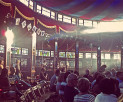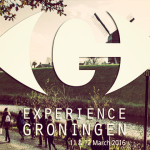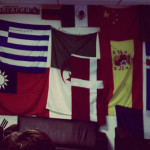Let Us Entertain You
As internationalisation continues to grow at the RUG, professionals in the arts scene in the city are also eager to find ways to fill their performances, galleries and other venues with a broader audience. ‘Let Us Entertain You’, a panel discussion about integrating and adapting for an international crowd in Groningen, took place on Thursday, 19 November in the Spiegeltent on the Vismarkt.
The panel was hosted by Marjolein Wiersma and Tom Wilcox, two members of the Groningen English-language comedy and improv group Stranger Things Have Happened. The panelists came from four different domains of the cultural scene in Groningen, ranging from the hyper local to the more internationally renowned.
Cultural life
Participants included Harmen van der Hoek from dance troupe Club Guy & Roni; Nadine van der Graaf from GM Insiders, a youth-orientated group from the Groninger Museum; theatre director Theo de Groot of Stichting Peerd; and Merlijn Poolman, a nightlife entrepreneur working with Simplon and Subciety.
The panel initially focused on questions about integration of the international audience in the cultural life of Groningen and what it is like to be someone who speaks little to no Dutch yet who wants to enjoy the arts, culture and entertainment in the city.
A melting pot
Welcoming internationals into the cultural scene requires a lot more conversation, says Van der Hoek. In many cases, good marketing is what works best, but if the performers of a group are a melting pot of different nationalities themselves, that can also be inviting. ‘We have nine different nationalities in our group and English is our common language’, Van der Hoek says.
De Groot, whose theater productions are often in the Gronings dialect and thus as local as it gets, sees the only way for the regional traditions to survive is to create a kind of a cultural crossover, which he did with his play Timbertown Follies, a story about World War One soldiers in Groningen which combined English and Gronings in its performance.
Cross-cultural
Creating a new kind of intercultural society united by music, dance, theater, and visual arts is also needed, says Poolman. Van der Graaf adds that bringing the arts into different cultural locations is an important step in drawing in the international audience, such as interdisciplinary events throughout Groningen and musical performances at the Groninger Museum.
Combining different art forms at various locations improves accessibility for an international audience, too. But that counts for Groningers as well, as audience member Marianne Veenstra points out. ‘The locals are also very much interested in cross-cultural performances.’
Scenesters
The second part of the panel centered on whether artists should adopt a different approach to attract international students as an audience. By creating a network of local creatives and a crowd beyond the Dutch population at workshops, the cultural scene could open the door more widely to internationals. In the same vein, Poolman suggested that an international café and an international community united by the arts could add to this increasingly multicultural city.
The discussion made it clear that the will to cultivate an international audience is there, as well as the hope that building up a loyal community beyond the Dutch scenesters will become self-sustaining: the more internationally attractive cultural events there are, the more there will continue to be in the future.
Let’s Gro began on Thursday, 19 November, and will continue until Saturday, 21 November with numerous events, workshops, and discussion panels about the dynamics, regeneration, and reinvention of the capital of the North.






